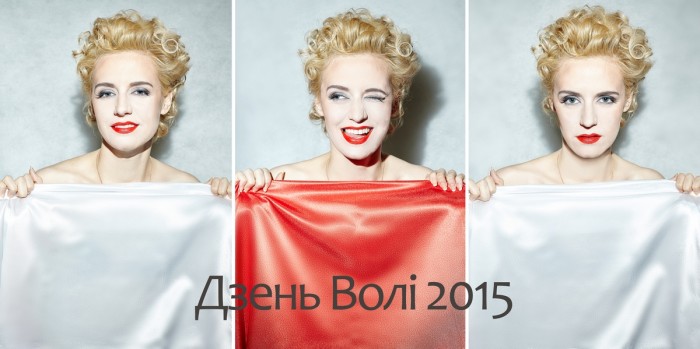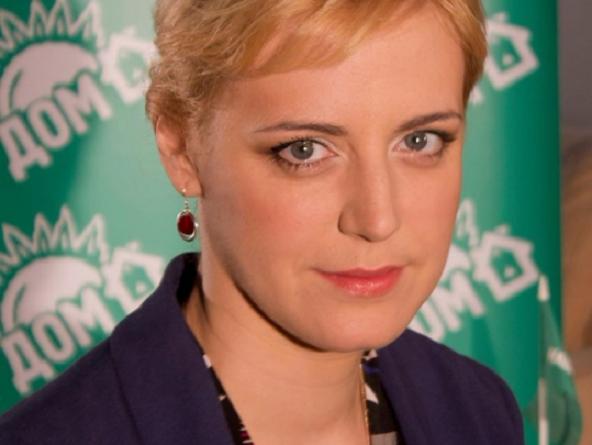For thousands of years, women in Belarus struggled
for equal rights. Finally, they have achieved
what they longed for:
a woman has the right to vote for either
Alexander Lukashenka or not against Alexander Lukashenka
Contemporary Belarusian folklore
We are very often asked why we started to disseminate weird pinup-like photos that people may sometimes find very sexist. So, we would like to explain our motives.
It is important to understand the way and principles of how Our House works: we are always eager to test various methods in order to achieve our goals. If one method does not work, we will look for another. Besides, we do not hold hopes that multiple repetition of one and the same method in the course of years will necessarily yield the required result. For about eight years now, we have taken a traditional and classical path of promoting female leadership in Belarus. Our experience based on those eight years tells us that we could repeat the same once again for eight more years. However, doing so will not bring about a systemic and persistent change in the situation with female leaders in Belarus. That’s why, after making some initial analysis of the situation, we have tried some new methods, and they have eventually proved worthwhile.
The results of the new methods two years after and our victory: Our House was the first organization to have highlighted the topic of female leadership in the public sphere. The same organization succeeded within two years to spin off the topic of a female presidential candidate. Heated debates on this topped online discussions in all media outlets over the past two years. Today, regardless of who among female leaders decides to run for presidency or a seat in the parliament, there is the foundation for that already in place.
We deserve to be proud of it. However, I would like to share some cultural peculiarities when it comes to female leadership in Belarus.
1. The causes of the problem with female leadership in the Belarusian public sphere
1. The image of a female leader (=a female stateswoman) does not exist in public consciousness. Belarusians can more or less easily imagine the portrait of a male politician: a tall man who is, as a rule, very loud, likes to command and put everything in order, has large palms, talks sincere nonsense, has many mistresses and extramarital children. By the way, that man is not necessarily Alexander Lukashenka. There are many opposition figures that perfectly fit into this description. The availability of a male politician character is the reference point to start from to be used in order to shape your own image of a male leader: tall-short, loud-soft, stupid-clever, etc. However, because this average male politician character is already there, it makes everything what male politicians do noticeable by society and media.
Such an average female-politician character is non-existent in public and political consciousness of Belarusians. What does it mean in practice? It means there is no reference point – either good or bad. The lack of the reference point (i.e. a female leader character) means that a female public figure remains unnoticed by society. This character does not appear in the public sphere, despite all the effort made by the woman. For example, since 2006, media outlets have run over 1.000 articles about Our House on a yearly basis or on average 3 stories per day. This is not bad at all even for a political party. However, a paradox emerges unexpectedly: the number of media mentions does not guarantee visibility. In other words, there may be many media stories about an organization or a leader. But if a character (opinion, image, discussion, etc.) does not exist in the public sphere, those media stories will remain unnoticed by public opinion, commentators, pundits, etc. For instance, we faced an interesting paradox. People who had known Olga Karatch personally since 1996 started to treat her as a totally new figure in the public sphere, as if their relations started from scratch and they just came to know her. What does it mean? It means that Olga Karatch was absent in their picture of the world. Nobody noticed her, because she remained in the “invisibility” zone.
Emotion-evoking provocations are needed in order to shape a female leader character in the public sphere. Basically, it does not matter at all what character exactly. What important is though that it has to be a reference point, a foundation, which can be adjusted. We have tried many different characters and images. It may seem strange but Belarusian society reacted mainly to the character of a blond woman (Marilyn Monroe style).
In this given situation when female leaders are “invisible”, any image that evokes an emotion is important. At this stage, it does not matter whether emotions are positive or negative. What matters is that emotions prevent female leaders from disappearing again in the “invisibility” zone. That’s why the character of a pinup girl is exploited in order to create at least some character of a woman in the public sphere. We need a reference point that we can start from in our work.
In another example, Our House announced that Olga Karatch would not be put forward as a presidential candidate. Despite the fact that three women said they were going to run for presidency this year, public interest in “female politics” dropped very quickly and the female politicians disappeared again in the invisibility zone. Why did society stop noticing them? This is because these women try to play by the rules of a patriarchal society without changing its structure. In other words, they try to distance themselves as much as they can from their gender – and by doing so they make their femininity invisible. This is what is called misogyny or the hatred or dislike of women. The wonderful article by the feminist Olga Stakhovskaya “Misogyny or what makes us have contempt for our gender”(http://www.wonderzine.com/wonderzine/life/life-opinion/213355-internalized-misogyny) describes quite a few manifestations of internalized misogyny, including the cases when a woman begins to behave and dress like a man and copies male behavioural patterns, seeking to be approved by men in a patriarchal society.
It is impossible to shape a female leader, if we, women, agree to play by the rules of a patriarchal society and conform to it. That’s why the interest from society and media in “obedient” women has dropped right away. This is because they behave in accordance with social expectations.
Europeans find it hard to understand this problem, because there are so many positive examples of successful women in politics and the public sphere in Europe. Female politicians in Europe are the characters that were shaped long time ago. Hence a certain cultural misunderstanding: why would Our House need to play with the images and characters of women in the public sphere and do something what Europe passed long time ago – as far as 50-60 years back? Similarly, we faced a lack of understanding when we were running the 252+1 campaign, which aimed to lobby for the abolition of the banned professions for women. If such a campaign sounds totally normal and understandable to any European woman or man, we in Belarus constantly face bewilderment and a lack of understanding even from independent trade unions as public opinion in Belarus in general displayed outrage over our campaign: “What’s wrong with the list of banned professional if it protects “our” women?”
2. Trauma experience of the previous generations of Belarusian women. World War II was the cause of an acute shortage of men in Belarus, thus leading to the situation when several generations of women were forced to be content with any man they could get. The woman’s success in society was measured by her marital status – whether she has the husband or not. The shortage of men over decades created a situation when the feminist ideals that women in the West had struggled, been imprisoned or repressed for were given to women in Belarus forcedly along with the status of a ‘loser’. In other words, if a woman is a leader, a deputy of parliament, a factory director, a school headmaster or a public servant, she is definitely a loser. A “successful woman” should sit at home and run her household as a housewife.
In fact, the chairwoman of Central Election Commission Lidziya Yarmoshyna publicly admitted her “female loser” status in the January 26, 2015 interview to TUT.BY. She said: “Perhaps, I simply can’t do anything but work as a lawyer – the lawyer in the field of electoral laws.”(http://news.tut.by/politics/431678.html).
She makes a point that the person who has chaired the Central Election Commission to ensure victory for Lukashenka for so many years that is nevertheless aloser who, being a woman, has not achieved anything and can’t do anything else but “work as a lawyer.”
Since being a female leader in Belarus is not something lucrative, the problem remains: how to attract a bigger number of women to the public sphere. All the women’s problems that were once raised and addressed by Western feminists have remained unnoticed in Belarus because of the peculiarities of this country’s historic development. In our view, the character of Marilyn Monroe-like woman proved to be successful in terms of the reaction of public opinion in Belarus. What happened was that society got puzzled: the woman who could have found a rich husband to sit at home (and to obtain the status of “a successful woman”), chose instead to enter the inherently non-prestigious sphere and become a leader – especially a leader in the highly marginalized civil society. Everyone becomes excited and begins to ask why, thus engaging in a debate. Triggering a public debate is exactly what we want to achieve at this moment.
3. One can’t leapfrog development stages, but arrival of the next stages can be stimulated. Currently, Our House is proud to moderate the public debate on female leadership in the public and political sphere in Belarus. We have our own internal plan of how to moderate this discussion. The first thing to be created at this initial stage is a public debate on whether a woman can be a leader who can run the country at all. Therefore, there is a need for a character which makes it very clear that you are not dealing with a man. That’s why the Blond character fitted very well at this initial stage. The next stage (to be implemented after the 2015 presidential elections) will involve a public debate on what a female leader should be like. Unfortunately, over the past two years, Belarusian public opinion got stuck on the level of discussion as follows: “Can a woman be a leader at all? Is she capable of taking logical and weighed decisions when she has periods?”
4. The Untouchables status for Belarusian opposition
Unfortunately, Belarusian citizens have an extremely negative perception of an opposition activist/politician. The Untouchables metaphor can be used here to describe such a status. To be a member of Belarusian opposition means committing oneself to inner emigration (or self-isolation), which gets amplified by language barriers (the majority of Belarusians speak Russian, and the Belarusian opposition speaks Belarusian – the sides simply do not understand each other), permanent appeals by Belarusian opposition to ethnicity issues that are not understood by the man in the street. Things get even more complicated by huge problems that Belarusian opposition community has with external communication and its closed nature.
Exit from the “opposition Ghetto” is difficult, because it causes resistance from the both sides: those in the “Ghetto” who try to resist the destruction of their warm and comfortable hive and society in general, which is not ready to destroy the “Ghetto” either. That’s why Our House always aims to destroy the “Ghetto” regardless of resistance that we face.
2. Provocation as a visualization tool that triggers the change of behavioural patterns
A provocation that generates public interest and discussions is always needed in order to destroy the old behavioural patterns and create new ones. Our goal is ambitious – that is to change the patriarchal behaviour models in the Belarusian public sphere. Otherwise, the patriarchal system will clone new masculine Lukashenka-type leaders with his (their) values but will change nothing in the system. However, we strive for systemic and sustainable changes when a new “Lukashenka” coming to power simply becomes inheritably impossible.
On December 1, 1955, Rosa Parks, a 42-year-old black worker at a department store in Montgomery, the capital city of Alabama, was detained and arrested for refusing to obey bus driver’s order to give up her seat in the colored section to a white passenger, as was required by Alabama segregation laws.
What she did was a deliberate provocation, which generated huge public interest and indignation by many people who were happy with color segregation and did not want to change anything in the existing system of political relations. But Park’s act of defiance triggered debates throughout America and became one of the symbols of the modern Civil Rights Movement that resisted racial segregation. Without her disobedience act, racial segregation of black Americans would have remained in the “invisibility zone,” as no one would have noticed the problem.
On March 3, 2012, two of the Pussy Riot punk band members, Nadezhda Tolokonnikova and Maria Alyokhina, were arrested and charged with hooliganism over the performance (described by the band as a punk prayer) staged at the solea of Moscow’s Cathedral of Christ the Savior. A third member, Yekaterina Samutsevich, was arrested on March 16.In August, the three members were convicted of hooliganism motivated by religious hatred (Article 213 (2) in Russian Federation’s Penal Code) and sentenced to two years imprisonment. Their trial and conviction were the unprecedented event in Russia in the recent years that grabbed media attention and immense public interest both in Russia and throughout the world. The act triggered a heated public debate about the role of Orthodox Church in the political life as well as about Russia’s judicial system per se. The debate has continued until today.
Sometimes, in order to form new rules and develop new standards, actions that exceed the limits of decency accepted in a patriarchal society are needed.
3. Conservatism vs.liberalism
After the break-up of the Soviet Union, opposition and civil society in Belarus were busy building their identity as a conservative Christian one based on traditional patriarchal values – in favor of a traditional family, against abortion, in favor of Christian Orthodox values yet appealing to the ethnic rights of Belarusians at the same time. From time to time, one can even hear some voices calling to “ban marriages between Belarusian women and foreign men.” Over the past twenty years, the heated debate has taken place on the ethnic rights of Belarusians. If one looks at those few public products delivered by civil society and penetrating the public sphere or advertising, all of them have a very clear sexist divide: love for women, success and career for men.
The conservatively-minded opposition can accept no other gender role distribution. In this respect, their irritation with the Merlyn Monroe character has other grounds: conservative thinking treats “Merlyn Monroe” as a woman who cannot be an ideal housewife, which obediently runs the household and brings up children while the husband pursuits his career. Her “disobedience” is dangerous in the first place, and this lack of control over women rings alarm bells in conservative minds.
Conservative opposition’s indignation reached its peak after a group of young people depicted a female warrior atop a horse and pink stains surrounding the woman, thus hinting at menstrual blood.
The picture, titled “Horsewoman”, generated massive protests from the Christian Conservative opposition members who went as far as to describe the image as “dances on the bones”, “encroaching on the sacral symbols” and “blasphemy.” The artist who painted the Pahonia coat-of-arms (the state emblem of independent Belarus in 1991-1995) which was used as a prototype for “Horsewoman” even filed a lawsuit in court against the authors of “Horsewoman.”
Our House could not just stay away from this. We “encroached” on yet another symbol of the Belarusian Conservative-Christian opposition – the white-red-white flag. On Freedom Day (or Dzien Volia in Belarusian), Our House did an art provocation, playing with the word Volia (it is a short form of Olga in Belarusian, and volia also means freedom). During the action, Olga Karatch was standing with a white-red-white flag, her shoulders naked, and holding a poster, which said: “Congratulations on Volia Day” or literally translated as “Congratulations on Olga Day.”
In other words, the woman was touching a “sacred symbol” with her naked shoulders, thus conducting a “blasphemy” act. The action grabbed huge media attention, which Our House could use to voice its stance on economic reform in Belarus.
The fight for women’s rights in Belarus is just beginning… Our House plans to and will play an active role in this process.















